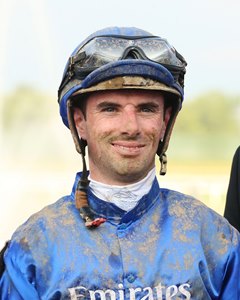Geroux Another Rider to Test Positive for COVID-19


The number of riders contracting COVID-19 continues to grow.
In a tweet July 14, jockey Florent Geroux said he had tested positive for COVID-19, becoming at least the fifth prominent rider to contract it over the past week. He follows Martin Garcia, Luis Saez, Victor Espinoza and Flavien Prat—the four of whom rode at Los Alamitos Race Course July 4.
Geroux did not ride at Los Alamitos, but rode at Indiana Grand July 8, as did Saez. Geroux later rode at Keeneland July 9-10 and July 12, and Belmont Park July 11.
Saez also rode at Keeneland Thursday and briefly on Friday before he was removed from his mounts after testing positive. Prat rode there Saturday before returning to California and testing on Sunday showed him as positive.
It is unclear when and where Geroux might have contracted COVID-19.
"I'm currently feeling well, quarantined, and looking forward to rejoining the racetrack when I'm cleared," he tweeted. "Thank you everyone for the well wishes. Stay safe!"
The recent cases of COVID-19 illustrate the health challenges riders face amid the pandemic, and some of the issues tracks have in protecting riders, who often share space with their counterparts and with valets in the jockeys' room.
COVID-19 safety protocols and compliance differ from track to track.
"I think we're lacking in consistency," said Terry Meyocks, president and CEO of the Jockeys' Guild.
Riders rode with masks at Keeneland last week but not all jockeys rode with them at Indiana Grand on Wednesday, the day of the Indiana Derby (G3), when Saez and Geroux were there. Winner's circle photographs there that afternoon also took place without regular social distancing and with limited mask-wearing from horsemen and attendees.
Keeneland had strict COVID-19 measures in place during its summer meet that ended Sunday, barring fan and most media attendance and allowing only a small number of owners and their guests to go the races. Riders had to submit to some testing and were assigned to designated areas depending on where they last rode.
Some tracks and racing commissions have now taken steps to limit travel from jockeys. The Ohio State Racing Commission said Tuesday that only jockeys who are currently riding or exercising horses within Ohio can continue riding at Ohio tracks. Indiana implemented similar regulations in that state last week.
The New York Racing Association also announced similar action Tuesday for its upcoming race meet at Saratoga Race Course, closing it to out-of-town jockeys. Any member of the regular NYRA jockey colony who travels to ride at any other racetrack will not be permitted to return to Saratoga.
New York-based jockey Junior Alvarado expressed his support for travel restrictions for jockeys in a tweet July 10 shortly after Victor Espinoza tested positive for COVID-19.
"Unless tracks change their policies about jockeys traveling back and forth, this will continue to happen and will obviously get worse," he tweeted from an account attributed to Junior and Kelly Alvarado.
Travel restrictions can come with a financial cost for some riders. Prior to the COVID-19 pandemic, it was not irregular for some jockeys to ride in Kentucky, Indiana, and Ohio at points during a given race week, and such multi-track participation also happens in the Mid-Atlantic and other regions.
Meyocks said the industry needs to work together to require regular testing of riders, properly space riders within the jockey's room, and thoroughly sanitize to maintain safety.
"Some tracks didn't follow that, and it's come back to bite us in the rear," Meyocks said.
The wait time for receiving COVID-19 test results presents a further obstacle, he said. In some states, tests are delayed in part due to the high volume of testing taking place across the U.S.
